The Dordogne is one of the most exciting destinations in France for expats. Britons especially love the Dordogne, which has the second-biggest British expat community after Paris.
The Dordogne has everything you need for a rewarding retirement – from entertainment to excellent living conditions. Many expats create a fantastic new life here, with bold new experiences such as renovating a farmhouse, learning French, starting a local business, or enjoying the social benefits of living in welcoming towns and villages.
In this guide, we’ll cover the topics you need to consider if you plan on retiring to the Dordogne. We’ll look at important factors like the cost of living, the best areas, and current expat communities you can connect with to help you make a well-informed decision.
Secure Peace of Mind with Best-Value International Health Coverage
International Citizens Insurance provide free, no-obligation quotes from the leading international health insurance providers with plans tailored to meet your needs. Trusted by thousands of expats worldwide.
The Dordogne as an expat destination
The region has much to offer anyone looking for an idyllic French lifestyle. It has some of France's most beautiful rolling countryside – perfect for walking or driving – and many places to explore and enjoy.
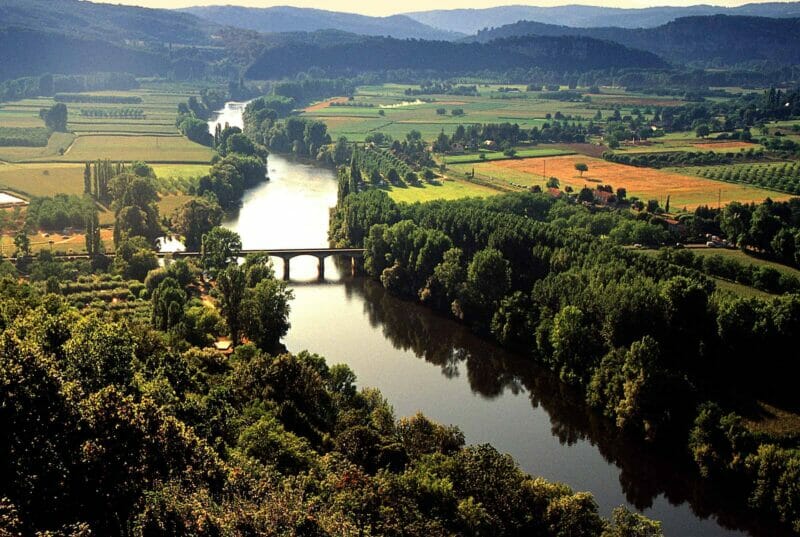
The Dordogne Valley is home to a wonderful mix of picture-perfect villages, medieval castles, mysterious caves, gorgeous food, and the calm, beautiful waters of the Dordogne River. Food lovers will be in heaven with the region's culinary pleasures, including truffles, foie gras, and delicious regional dishes.
The region also has a rich historical heritage. Its well-kept medieval castles (chateaus in French), prehistoric cave complexes (Lascaux, for example), and more recent historic sites like the Cabanes du Breuil are among its highlights.
Of course, French is the main language, but the area is popular with Brits, meaning English is fairly widely spoken. It’s well worth learning some French, and language classes are quite common in expat circles.
Climate and weather
The Dordogne region enjoys a typical temperate French climate with hot summers and cool winters, but variations can be experienced depending on the area and the time of year.
Summer: In July and August, temperatures often reach their peak, maxing out around 40°C (104°F) during the hottest days. These months are typically dry and sunny, perfect for enjoying Dordogne's outdoor lifestyle, from river activities to exploring the region's historical sites. Heatwaves can occasionally push temperatures even higher, but the mornings and evenings often bring relief with cooler breezes, especially in rural and forested areas.
Winter: Winters in the Dordogne are cool but not harsh, with temperatures often dropping to freezing or just below. The average winter day sees highs of around 8°C to 10°C (46°F to 50°F), and while snow is rare, frost is common during the coldest months (December to February). Rural areas, particularly near the rivers and valleys, tend to experience colder, mistier mornings.
Microclimates in the Dordogne
While the overall climate is mild, there are some variations in microclimates across the region due to its diverse geography.
The Périgord Blanc (White Périgord): Located centrally, this area is characterized by limestone plateaus and agricultural fields. Its climate is relatively balanced, with hot summers and cold winters, though it tends to be drier than the northern regions. The limestone terrain contributes to rapid heating during summer, but also quick cooling in the winter months.
The Périgord Vert (Green Périgord): Located in the north, this area is known for its lush, green landscape, which benefits from slightly cooler and more humid conditions due to its proximity to higher elevations and dense forests. Summers here may be slightly less intense, while winters can bring more fog and frost due to the wooded terrain.
The Périgord Noir (Black Périgord): Famous for its dense forests and truffles, the Périgord Noir enjoys slightly warmer conditions, especially in the southern part of the region. Summers can be hot and dry, but the forested areas offer some shade and cooler pockets, while winters tend to be milder compared to the northern areas.
The Périgord Pourpre (Purple Périgord): Known for its vineyards and wine production, the Périgord Pourpre to the southwest has a warm and dry climate, particularly in the summer months. This area experiences more sunshine and less rainfall, making it ideal for viticulture. However, winters can still bring frosty mornings, although snow is rare.
Travel connections and transportation
Air travel
The Dordogne is served by three regional airports:
Bergerac Dordogne Périgord Airport (Aéroport Bergerac Dordogne Périgord): The largest and most frequently used airport in the region for international travel. It has regular flights to the UK (London, Bristol, Southampton, Manchester, and more) with budget airlines like Ryanair and British Airways.
Bordeaux-Mérignac Airport: Located about 1.5 hours by car from Dordogne, this larger airport offers a wider range of international flights, including connections to the rest of Europe and North America.
Brive-Souillac Airport: A smaller airport located near Brive-la-Gaillarde in the northeast of Dordogne offers a limited number of flights, primarily to destinations in France and the UK.
Trains
The main train stations of the region include Périgueux, Bergerac, and Sarlat-la-Canéda, with connections to larger hubs like Bordeaux and Paris.
For example, traveling from Périgueux to Paris by train takes around 4 hours with ticket prices ranging from €40 to €90, while a direct train from Périgueux to Bordeaux takes about 1 hour 40 minutes and costs between €20 and €30 for a one-way journey.
Buses
The Dordogne has a limited bus network, mainly catering to local routes between towns. These are useful for short trips but not ideal for long-distance travel.
Do you need a car in the Dordogne?
You'll probably find that having a car is pretty essential if you're moving to the Dordogne, especially if you're settling in one of the more rural areas. The region is stunning but quite spread out, and public transport can be limited depending on where you are. However, whether you really need a car depends on the exact spot you choose to call home.
When you'll definitely need a car
In the countryside (e.g., Périgord Noir, Périgord Vert): If you're living in more remote areas, like near Sarlat-la-Canéda or Brantôme, you'll definitely want a car. Public transport is pretty hit or miss, and the train lines don't cover the smaller, off-the-beaten-path villages.
For example, if you're out in a tiny village in Périgord Noir, you'll need a car to get to the supermarket, visit the doctor, or just go about your day-to-day activities. Plus, driving is a lovely way to explore the countryside at your own pace.
When you could get by without a car
In larger towns (e.g., Périgueux, Bergerac): On the other hand, if you’re living in a town like Périgueux or Bergerac, you can probably manage without a car. These places are more walkable, and public transport options, like buses and trains, are more frequent. You'll be able to do most things on foot or by bike, and if you want to travel further afield, you can always hop on a train to Bordeaux or Paris without too much hassle.
Retiring to the Dordogne
The Dordogne is a great place to retire.
Deciding whether an area is good for retirement depends on what you expect to get out of life in that location. The Dordogne offers the greatest potential to retirees who want to indulge in a more relaxed, less time-conscious French way of life, from enjoying fine wines over a long lunch to pottering around your home and garden in a warm and present climate.
You are in the right place if you love nature, walking, history, the arts, and a sense of serenity.
The Dordogne has the largest number of villages, boasting the title of “Most Beautiful Villages in France.”
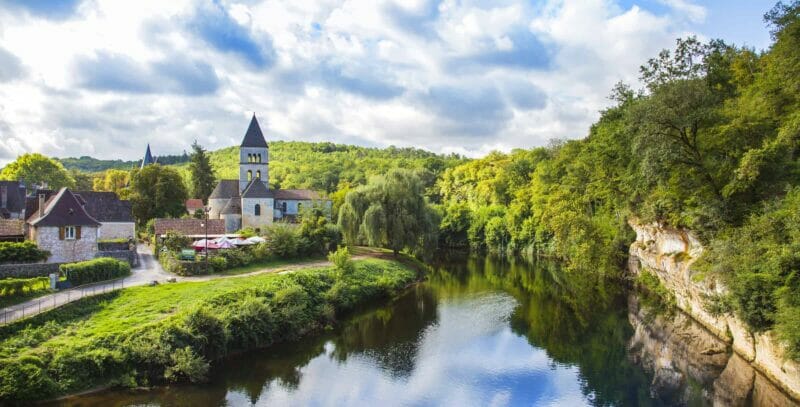
Saint Leon Sur Vezere is a small and very pretty village in the Vezere Valley between Montignac and Les Eyzies, set in a curve of the Vézere River.
There are infinite picturesque walks to enjoy the natural beauty and remarkable architecture. Périgueux, Bergerac, and Sarlat are labeled ‘Towns of Art and History’, with vast, protected areas to explore.
You can go walking, horse riding, cycling, or canoeing in one of the region’s 33 parks and gardens.
Love music? There are about thirty various music festivals taking place in the Dordogne. From Classical to Baroque music to unusual, eclectic Jazz and African rhythms, there’s something to suit all tastes.
Like any other location in the world, this beautiful area of France has pros and cons. However, the Dordogne offers expats a brilliant lifestyle, so it’s hugely popular.
Additionally, buying property in the Dordogne can be more affordable than in major cities in France, making it an attractive option for those looking to purchase a home or invest in real estate.
The advantages and disadvantages of living in the Dordogne
The advantage (or disadvantage, depending on how you feel about it) of the Dordogne is that it’s a popular destination for British expats. This means there’s a fairly sizeable English-speaking community, and you can choose how much you want to integrate into this community.
After all, you don’t have to mix with expats all the time if you don’t want to. Doing so brings some advantages, such as learning from their experience and assisting with general admin processes.
A big advantage of living in the Dordogne is enjoying good value for money on property prices. The region benefits from being fairly spacious, meaning land has lower values.
But this isn’t necessarily true when moving to a large town or city. If you want low property prices and the most “authentic” French experience, you will do better moving to a smaller town or village. Smaller towns offer a more genuine French lifestyle, with local markets, traditional festivals, and a close-knit community feel.
The region is a great choice for those who want to enjoy an active retirement, as it offers plenty of historical and cultural activities. It’s also a good choice for foodies and wine lovers.
The Dordogne is inland; there’s no coast. So, take advantage of the freshwater swimming. The Dordogne River is the cleanest in France and has been awarded UNESCO biosphere status. If you don’t feel safe swimming alone, choose one of the many supervised beaches of the Dordogne Valley.
Perhaps the only people the Dordogne wouldn’t be ideal for are those seeking a more uptempo urban lifestyle. The largest city in the region is Perigueux, which has around 40,000 residents. This pales compared to cities elsewhere in France, such as Nice or Marseille, with over 1 million residents.
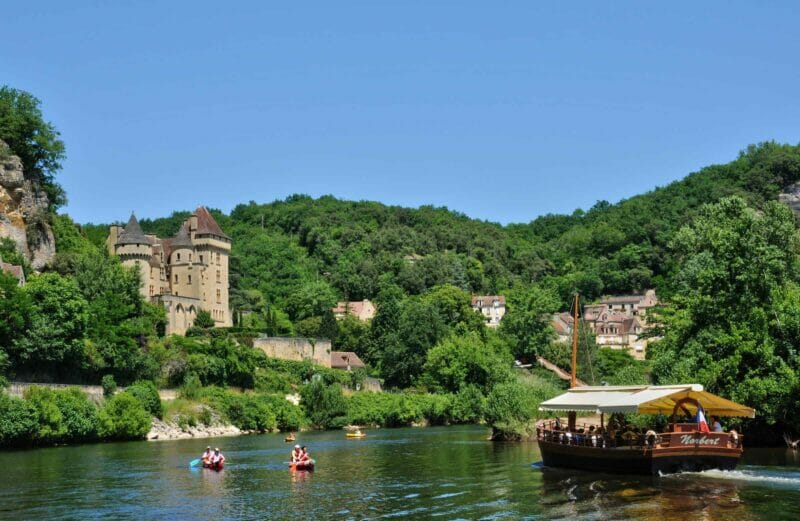
The Dordogne River is perfect for kayaking and boating. It’s calm and serene, there are no rapids, and the scenery it provides is amazing.
Here is the summary of the pros and cons of the Dordogne as an expat destination:
Pros of living in the Dordogne:
- Affordable cost of living: Lower than many other parts of France, especially for housing and groceries.
- Beautiful countryside: Stunning landscapes, rivers, and medieval villages; perfect for nature lovers.
- Rich history and culture: Historic sites, châteaux, and vibrant local traditions.
- Strong expat community: Well-established expat presence, especially from the UK.
- Relaxed lifestyle: Slower pace of life, ideal for retirees or those seeking tranquility.
Cons:
- Limited public transport: A car is essential, especially in rural areas.
- Job opportunities: Employment options are limited, particularly for non-French speakers.
- Winter can be quiet: Many tourist areas slow down in the off-season, which can feel isolating.
- Language barrier: While some locals speak English, learning French is important for deeper integration.
The food and wine
Dordogne is home to some world-renowned wines, thanks to its climate. You’ll find dry reds and whites and sweet dessert wines. Look for Bergerac wines, dry whites from Montravel, and full-bodied reds from Pecharment.
The food is amazing all year round. Dordogne is home to truffles and cep mushrooms (penny bun/porcini), among the world's tastiest mushrooms. You can buy them at local markets or go foraging in the autumn if you have the knowledge and a guide.
Perigord Noir, a part of the Dordogne, is renowned for its excellent food and culinary heritage.
Several Michelin-starred restaurants and fantastic local eateries are also nearby. In short, the Dordogne is ideal for those who like their food and drink!
Safety
Dordogne is one of the safest areas in France. Due to its lack of highly populated cities, there are somewhat limited official crime statistics relating to the area.
However, the French National Crime Statistics Agency rates the Dordogne as one of the lowest crime areas in the country.
Dordogne's crime rate is considerably lower than that of many places in the UK and the US, so if you're happy living in a British or American city, you should have no concerns about moving to a French town in Dordogne.
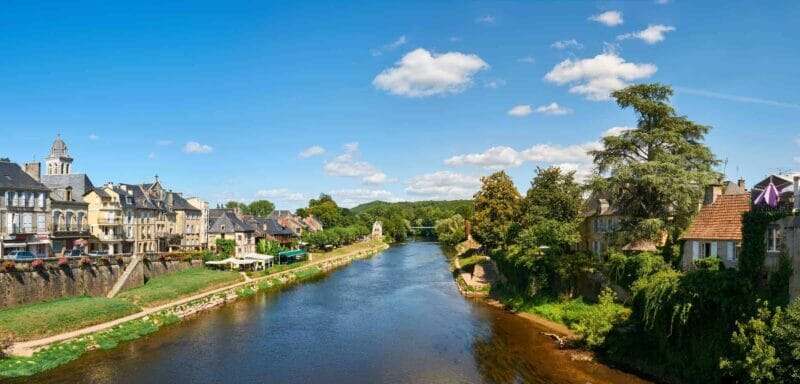
Montignac: this very pretty village on the Vézère River is most famous for being home to the Lascaux Caves
The cost of living in the Dordogne
The cost of living in the Dordogne is significantly lower than in the UK and the US.
Consumer prices in supermarkets are approximately 6% lower in France than in the UK and 11% lower than in the US. However, Dordogne prices tend to fall well below average prices in France. Also, you’ll save a great deal of money by shopping locally and seasonally; this is the preferred model in areas of regional France.
Here’s a list of major day-to-day expenses in the Dordogne:
- Groceries for a couple: €300 - €400 per month
- Bottle of wine: €5 - €10
- Utilities (electricity, heating, water): €150 - €175 per month
- Internet: €30 - €40 per month
- Mobile phone plan: €15 - €25 per month
- Petrol (per liter): €1.80 - €2.00
- Lunch at a café/restaurant: €12 - €20 per person
- Doctor’s visit: €25 - €30 (often reimbursed through the French healthcare system)
- Health insurance (top-up via Mutuelle): €50 - €100 per month
For a couple, a comfortable life in the Dordogne, including rent, groceries, utilities, and leisure activities, can be maintained on around €2,000 to €2,200 per month. If you own your home, these costs drop further.
Housing costs
Renting
In larger towns like Périgueux and Bergerac, you can find a well-maintained one or two-bedroom apartment in good areas for around €500 to €700 per month.
If you're looking for more space, rental houses or townhouses with 2-3 bedrooms in these towns typically range from €800 to €1,000 per month, depending on proximity to amenities and the overall condition of the property.
In more rural areas or smaller villages, such as Sarlat-la-Canéda or Brantôme, prices are even lower. A charming stone farmhouse or cottage with 2-3 bedrooms can be rented for around €600 to €900 per month.
If you are seeking a countryside escape with more land, you can find larger properties with additional outdoor space starting at around €1,000 per month, especially in less tourist-heavy areas.
Buying real estate
House prices in the Dordogne vary significantly depending on the area, but overall, the region offers excellent value for money compared to other parts of France.
In more rural areas like Périgord Vert or Périgord Noir, you can find charming 2-3 bedroom stone houses in good condition starting at around €150,000 to €200,000, especially if you’re willing to be a bit further from main towns.
In more popular and tourist-heavy areas, such as Sarlat-la-Canéda or Bergerac, prices are a bit higher, with well-maintained 2-3 bedroom homes typically ranging from €200,000 to €300,000, depending on proximity to amenities and scenic views.
If you are looking to live closer to Périgueux, the region’s capital, similar homes often start at around €250,000, though prices can rise if you're looking for something with character or recently renovated.
Property restoration
You'll save the most money by purchasing a home that needs renovation.
A run-down property in the Dordogne can cost as little as €50,000 to €100,000, and it’s not uncommon for these homes to come with large plots of land, often 1 to 3 hectares (around 2.5 to 7.5 acres).
However, restoring them can be a serious financial and time commitment. Depending on the condition, you might need to invest anywhere from €50,000 to €150,000 or more to bring the property up to modern standards, especially if major structural work is required.
Skilled labor, like electricians or plumbers, can cost €30 to €50 per hour, and depending on the extent of the renovations, restoration projects can easily take 6 months to 2 years. If you have DIY skills, you can save a significant amount, but if the work is beyond your expertise, factor in hiring local professionals, which can add up quickly.
- Renting A Property In France – rental procedures and rules in France you need to know before signing a French rental contract.
- A Complete Guide To Buying A Property In France – understand how property purchasing is done in France to avoid costly mistakes.
The best places to live in the Dordogne
The region has many beautiful villages and towns, and it’s difficult to say which locations are the best. Expats tend to choose the location that best suits their lifestyle. Although the entire region is popular with expats, they’ve generally centered around several towns.
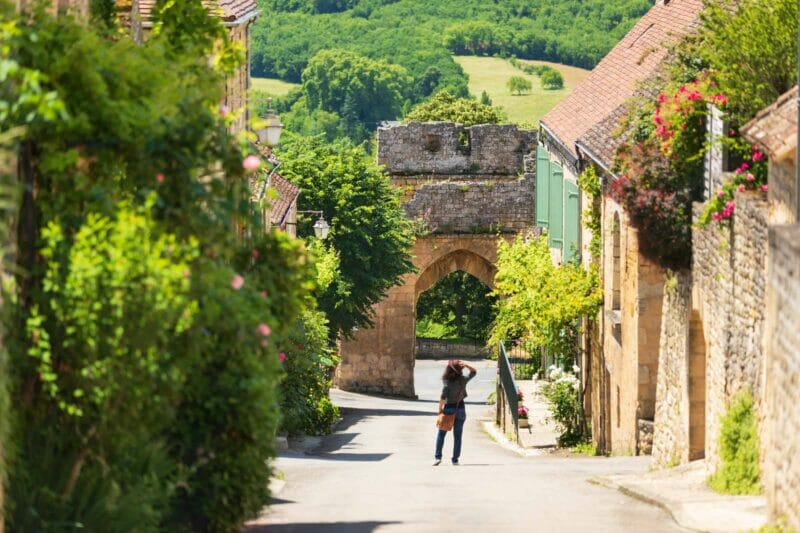
Living in Bergerac, for example, is highly appealing due to its charming atmosphere and excellent transport links, including proximity to an airport and the TGV to Paris, making it convenient and accessible.
Another one of the most beautiful villages in France, the village of Domme, with its hilly streets and unprecedented views across the Dordogne Valley
Here’s a breakdown of some of the most inviting places to live in Dordogne:
Bergerac
Bergerac is a moderately sized commune in the Dordogne with a prominent British population. This is mostly due to the locality of the airport, which offers convenient connections to the UK.
Overlooking the Dordogne River, Bergerac is famous for its excellent wine. The British population has given rise to the Universite du Temps Libre, a non-profit organization that offers French language lessons and arranges cultural activities.
Regardless of your desire to live among other expats, Bergerac is an attractive retirement destination. The Facebook group Living in the Dordogne – Perigord serves as a platform for English speakers to connect with other expats and exchange information.
Eymet
Eymet is a commune roughly 24km south of Bergerac. Around a third of its population is British. It still retains its local charm, including open-air farmer's markets and a Bastide (fortified town) built in the 13th century.
Lalinde
Lalinde is a small commune about a 30-minute drive east of Bergerac. Its population is around 3,000, a sizeable number of whom are British. Like Eymet and Bergerac, its appeal to British expats is the local airport. Lalinde has plenty of historical value, as it was a key battleground in the Hundred Years' War.
Domme
Domme is built on a hilltop and overlooks the Dordogne Valley. Many of its buildings are original and retain their French style. Prices are on the higher side, but many have been modernized inside. It's 74km east of Bergerac, so airport connections are convenient.
Perigueux
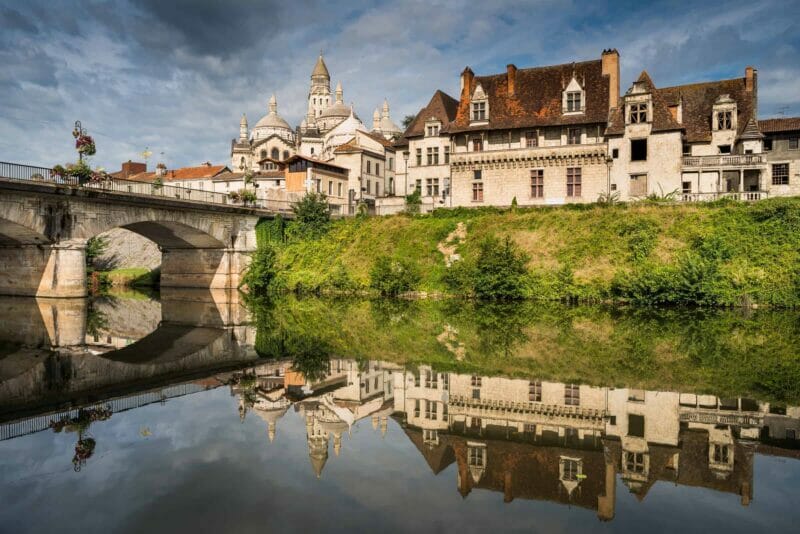
The ‘capital’ of the Dordogne department – Perigueux
Perigueux is the capital of the Dordogne and is its largest city. Even so, it’s not massive and has plenty of historical charm. The area has three airports, so it would be ideal for those considering setting up a B&B in retirement.
Additionally, Perigueux is just a couple of hours' drive from major cities like Bordeaux and Toulouse, making it easily accessible for visitors and residents alike.
Brantome
Brantome is located on the river Domme and was formed around the 8-century abbey built by Charlemagne. The abbey has since been rebuilt but is breathtaking and is home to one of the oldest Romanesque bell towers in the country. Its population is less than 2,500, so it's a fairly quiet area.
The most beautiful towns in the Dordogne
If you're not already convinced by the region's offerings, the Dordogne is home to 22 towns that regularly appear on lists of the most beautiful towns in France.
While you might not want to live directly in these towns (tourism is often higher in these locations), they make great day trips and amazing sightseeing opportunities. Here's a summary of some of the most beautiful towns in Dordogne.
Rocamadour
Rocamadour is built vertically into a cliff face and has some incredible architecture. This is one of the main tourist hotspots in the Dordogne.
Martel
Martel is home to a booming truffle trade and has a steam train that takes you around the valley cliffs.
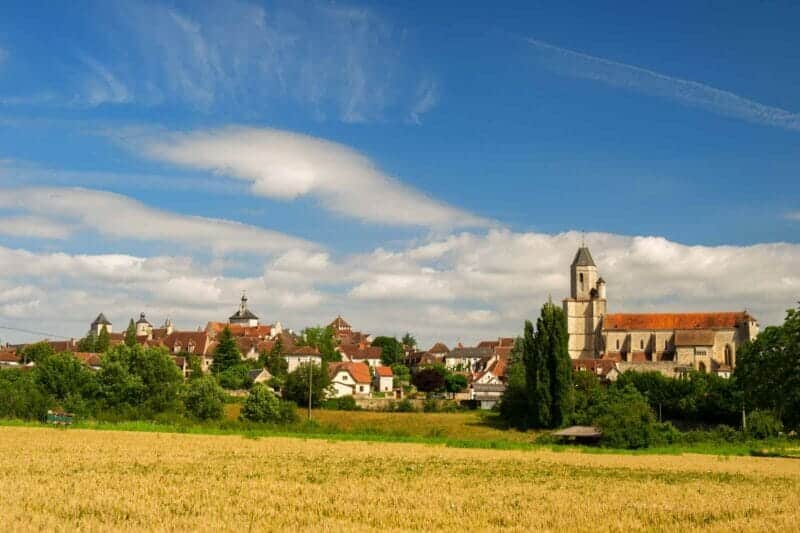
Martel is known locally as the town of the seven towers, and, yes, it's also one of the most beautiful towns in France.
Beaulieu-sur-Dordogne
Its name translates as “beautiful place,” and it's easy to understand why when you see it. The medieval market town borders a river surrounded by woodland—everything you'd expect from a typical French town.
Carennac
Carennac is a combination of medieval and Renaissance buildings along a sleepy river. It's worth visiting to take it all in. You won't be disappointed.
Turenne
Turenne is built around a hilltop castle that sticks out of the surrounding countryside. It offers amazing views of the area and is a popular destination for hikers.
The Dordogne offers so many picturesque towns and villages that you could spend your whole retirement just visiting and exploring them.
Living in the Dordogne in winter
As mentioned, the winters in Dordogne can get pretty cold. This shouldn't be enough to put you off considering the area for your retirement, as there are plenty of ways to deal with the cold.
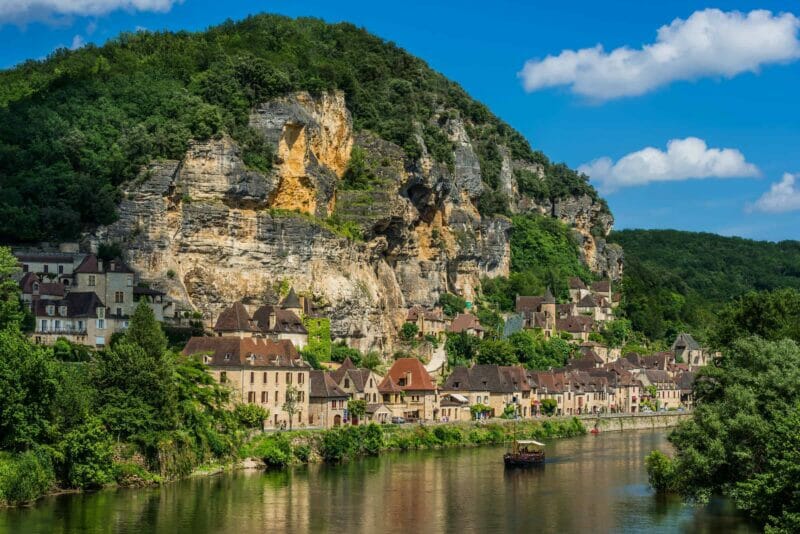
Another beautiful village of La Roque Gageac in the Dordogne. The village boasts a ‘tropical style' exotic garden you can wander through as you walk up the hill.
For this reason, most older French properties have incredibly thick insulated walls, meaning the indoor temperature stays relatively constant. Also, you'll likely have a fireplace, which will come into its own in the winter.
You don't need to worry about roads either. Although administration processes in France have a debatable reputation, one thing they know how to do is clear roads of snow. Agriculture is a big business in France, and kids need to get to school, so even in the most rural areas, you can expect roads to be cleared by early morning.
Tourism isn't a massive business in much of the Dordogne, and entertainment tends to die off in winter. Providing the weather is good, you'll still be able to visit local towns and go out for meals, so don't worry about finding things to do.
Final thoughts on living in the Dordogne
Although living in the Dordogne might not sound as glamorous or sophisticated as living in Bordeaux, it remains one of France's most popular retirement areas.
The Dordogne has everything you could wish for from a French retirement destination. It also has some of the most attractive property prices in the country. The impact of the UK market on property and tourism in the Dordogne is significant, especially considering the implications of Brexit and the pandemic.
If you’re considering retiring to France, especially the Dordogne. In that case, it might be worth touring the area, staying at some gîtes (or renting), and trying to get the inside scoop from local expats. Plenty of them are around, so this shouldn’t be too difficult!
For retirement, you could do a lot worse than the Dordogne. There’s very little in the way of negatives for the region, but just be sure to weigh everything carefully when considering your ultimate retirement destination.
- What’s It Like Living In Brittany As An Expat
- The Insider Guide To Living In Paris As An Expat
- Discover What It’s Like Living In Toulouse As An Expat
- What Is It Like Living In Burgundy, France
- Living In Montpellier, France
You might find helpful:
- Living In France Guide – everything you need to know to plan your move and settle down in France;
- The Best Places to Live in France – a detailed overview of France’s most popular locations for expats.
Secure Peace of Mind with Best-Value International Health Coverage
International Citizens Insurance provide free, no-obligation quotes from the leading international health insurance providers with plans tailored to meet your needs. Trusted by thousands of expats worldwide.




